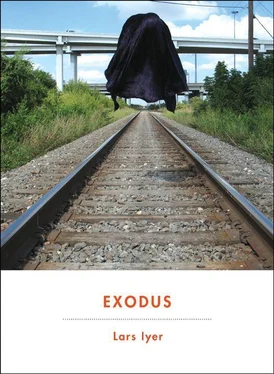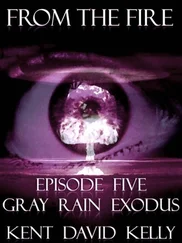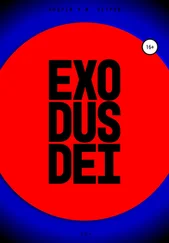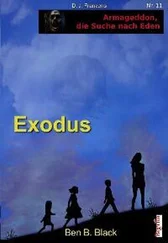W.’s exhausted, he says. The judgement is nearly over. A final round!
‘Do you think you fool people?’, W. asks. ‘Can others read your stupidity in your eyes, do you think? Can they see your idiocy in your gait? Your posture?’ And then, ‘Do you have a sense of your idiocy — a real sense? Do you grasp just how desperately you’ve fallen short?’
Dawn. Daylight behind the blinds. The judgement’s over. W. reads out a passage from Kierkegaard, which he copied into his notebook:
What does God want? He wants souls able to praise, adore, worship, and thank him — the business of angels. And what pleases him even more than the praise of angels is a human being who, in the last lap of this life, when God seemingly changes into sheer cruelty, nevertheless continues to believe that God is love, that God does it out of love .
If he’s cruel to me, it’s out of love, W. says. It is meant as the highest kindness, when he sits on the Chair of Judgement exploring the many compromises of my life, my betrayals and half-measures. Who else would have taken notice? Who else would have tried to teach me the meaning of sin ?
Ah, would that he had a similar tutor! Would that someone had the same interest in him! But perhaps my ingratitude is, for W., only a version of God’s cruelty. Perhaps my moaning in protest , as he sits above me on the Chair of Judgement, is only a way for God to test the extremity of W.’s love.
Morning. The Royal Observatory, high on the hill. This is where the first international terrorist incident took place, W. says, reading from a plaque. A young French anarchist attempted to blow up the Observatory, to blow up Greenwich Mean Time …
To change time, to change the order of time: isn’t that the aim of any revolution? W. says. We have to recover the dimension of possibility . The dimension of the infinite!
Time touched by eternity : he’s always found this Kierkegaard phrase very moving, W. says. There is the time that passes , Kierkegaard argues — this instant, then that, which we merely endure, which merely carry us along. And then there is time touched by eternity , Kierkegaard says, which allows past, present and future to assume their true role in our lives, as phases of development . Once time has been touched by eternity, we no longer simply persist in time, but deepen and grow. We come to exist temporally , living towards a future that we earn by our deepening, by our growth: that’s what Kierkegaard argues.
Time touched by eternity : is that what is meant by revolutionary time ? W. wonders. Is that why the French revolutionaries renamed the days of the week? Is that why they remade the calendar?
Tarrday , that’s we should rename Monday, W. says. Krasznahorkaiday : it’s a bit of a mouthful, but that’s what Tuesday should become. And Weilday instead of Wednesday. Cohenday instead of Thursday. Friday can be Deleuzeday . And Rosenzweigday , for the day of the Jewish Sabbath. And Sunday: Kierkegaard-day : why not? W. says.
The view from the hill. The City, across the river, all bombast, with its great towers to Mammon. The domes of Greenwich Naval College. The low-rise estates on this side of the river, to which the poor of London moved when their houses were bulldozed.
Sometimes, W. longs for a great explosion in the sky. For a nearby star to burst across the heavens. For a comet’s head, blazing towards us. Ah, why is it easier to imagine the end of the world than to imagine the end of capitalism?
Tottenham, emerging from the Underground.
W.’s not surprised that a madman came to sit next to us on the train. Did the madman sense that we had something in common? Did he believe us to be akin , somehow? Like-minded, somehow?
He looked like one of Tarkovsky’s holy fools, lost in the mud, W. says. He looked like Alexander Kaidanovsky in Stalker . A man of great sadness, but of great hope, too. Of course, our madman was a religious man, as all madmen are religious, W. says. He was an apocalyptic man, as all madmen are apocalyptic.
The madman spoke of the end of the world. W. nodded in agreement. He spoke of the last judgement. W. affirmed what he said. He spoke of the remnant, of the last stand of the righteous. Yes! W. exclaimed, a number of times. He spoke of Nostradamus, and W. demurred. He spoke of astrology, of the lining up of the fixed signs of Aquarius, Leo, Taurus and Scorpio in the shape of a cross, and W. kept quiet. But when the madman quoted chunks of the Book of Revelations, W. brightened again.
‘ And there fell a great star from heaven, burning as if it were a lamp ’, the madman said, as he rose and set off down the carriage. ‘ And it fell upon the third part of the rivers, and upon the fountains of waters …’, he cried back as he wandered down the carriage. ‘ And the name of the star is called Wormwood! ’, he shouted, turning and facing us for the last time.
We mustn’t be afraid to see our world in apocalyptic terms, W. says. In religious terms. The language of the Last Days is wholly appropriate to our times.
We know what is coming. We know that a new dawn — the opposite of dawn — will spread its dark rays from the horizon. We know that the time will come to put down our pens and close our books …
Climatic catastrophe. Financial catastrophe. W. quotes the prophet Joel: ‘ the rivers of waters are dried up, and the fire hath devoured the pastures of the wilderness ’. And he remembers what the prophet Jeremiah saw in the ruins of Jerusalem: the earth without form and void. The heavens without light. The very mountains reeling …
He had a strange dream the other night, W. says. I had become a kind of priest . A Hindu priest, with lines of ash on my forehead, and my hair long and pulled back into a topknot.
I was speaking the Law, W. says. Not about the Law, but the Law itself, as if it could be spoken. As if I would know the Law.
I spoke in a low murmur, W. says, that was inseparable from a rumbling all around us. The skies were darkening, W. says. Storm-clouds were massing in the sky.
It was like the Biblical disasters, W. says. The great flood. The plague of locusts. The destruction of Sodom. But it was worse, W. says. It was more terrible, even as it seemed to leave everything intact.
The destruction of the world was the world: that’s what suddenly became clear to him, in his dream, W. says. The end of the world was already present in every detail of the world. The eschaton was already here; the apocalypse was already happening.
Middlesex University has the crappiest of campuses, we agree. It looks like a primary school from the ’70s, all terrapins, all plastic chairs. But from the crappiest campus, the greatest thought …
So what are we doing here? W. wonders. Why did they invite us? You’d have thought they’d have wanted us to keep away . That we’d have been banned , not invited.
There are people at Middlesex who can think , for God’s sake! And now we’re here, we who are in no way capable of thought. We’ll have to depend on our charm (on W.’s charm). We’ll have to use our natural wit (W.’s natural wit). — ‘And you can do your monkey dance for them’, W. says. ‘That should buy us some time before they lynch us’.
Morning beer before our paper. Dutch courage at the first open pub we find.
Ah, why did he bring me with him for his Middlesex debut? W. wonders. What will his Middlesex friends make of me? ‘What is he doing here?’: that’s the question W. will see in their suddenly narrowed eyes. You, we understand, but him …?
Читать дальше












